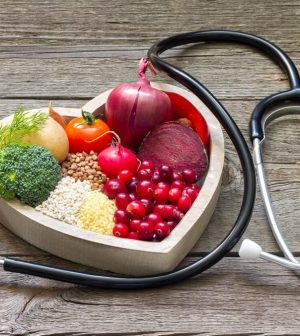- Could Your Grocery Store Meat Be Causing Recurring UTIs?
- Are You Making This Expensive Thermostat Error This Winter?
- Recognizing the Signs of Hypothyroidism
- 10 Strategies to Overcome Insomnia
- Could Artificial Sweeteners Be Aging the Brain Faster?
- Techniques for Soothing Your Nervous System
- Does the Water in Your House Smell Funny? Here’s Why
- Can a Daily Dose of Apple Cider Vinegar Actually Aid Weight Loss?
- 6 Health Beverages That Can Actually Spike Your Blood Sugar
- Treatment Options for Social Anxiety Disorder
It’s National Nutrition Month: Here’s Tips to Eating Right

Cutting out nutrients such as carbs, fat or protein may be a popular way to shed pounds but doing so can have unintended consequences.
Instead, aim for a balance of those macronutrients to fuel your life and activities, said Dr. Elizabeth Albright of University of Michigan Health-West in Wyoming, Mich.
In a university news release, she offered some suggestions for a balanced diet that will fit your lifestyle and offer the right fuel.
Food is necessary to live, so don’t think of it as “good” or “bad”: Just because certain foods may fuel you toward your goals more effectively doesn’t make other foods bad, Albright said. Like putting unleaded gas in a diesel engine, some foods just aren’t the right fuel for you and can damage your body. Gender, race, genetics, metabolism and hormone levels all affect nutrition needs.
Change your mindset: Rather than following a “diet” that has an end date, make your food habits a lifestyle.
Pass on processed foods: Reducing your intake of processed foods will improve your general sense of well-being and lead to improvements in chronic disease and often weight loss. The chemicals used to increase foods’ shelf life are often highly inflammatory to the body, Albright said, which can put stress on organ systems and, eventually, cause dysfunction.
Choose these foods: Build your menu around lean meats and proteins. Include fruits and veggies for bulk. Then add a carbohydrate for texture, flavor or crunch, Albright suggested. Carbs should be the side, not the focus of the meal.
Be a hacker: Food hacks can help you at times when you most struggle with nutrition. They can include meal prepping, meal kits, slow-cooker meals or healthy grab-and-go snacks.
Do your prep work before dining out: Review the menu and choose your meal before you go. This limits temptations in the moment. Find a few nutritious options to rotate through if you eat out often.
Food can taste good and be good for you: You can’t scrap both fat and sugar and stay healthy; your body needs both, in moderation. Watch your salt intake. Be generous with spices. Experiment with different flavor combinations, Albright suggested.
Involve your family: Prepare foods together. Let the kids safely cut up veggies or measure out dry ingredients when you cook. Introduce them to healthy eating at a young age.
Dietary needs are individual: Getting a well-rounded diet that has the balance of all the nutrients that your body needs is the most important. Ask your doctor or registered dietitian about specific needs for your situation.
More information
Myplate.gov has more on healthy eating.
SOURCE: University of Michigan Health-West, news release, March 15, 2023
Source: HealthDay
Copyright © 2026 HealthDay. All rights reserved.










